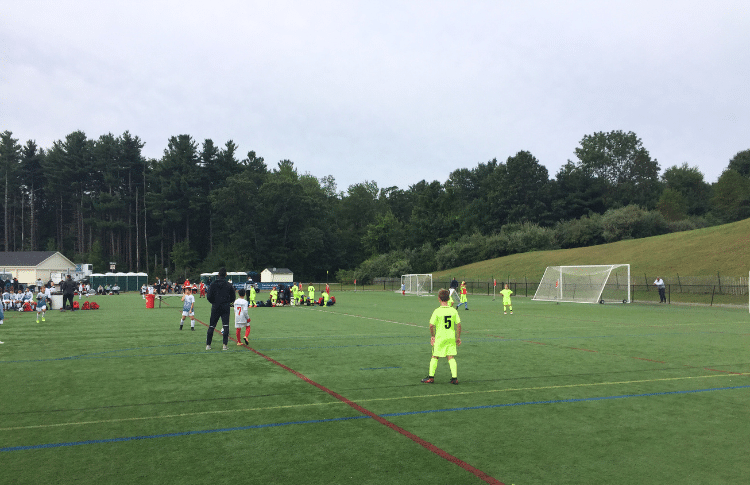Should I Take a Break from Soccer?

If you’re asking yourself, “Should I take a break from soccer?”, then you are probably in a little predicament. There’s perhaps an underlying reason why you are asking this question.
Before you throw your cleats in the closet, read this article to help your decision!

Obviously, there are many factors that come into play when considering whether to take a break from soccer, such as your age, skill level, environment, passion, and overall health. It’s important to weigh the pros and cons before making a decision. Let us be the voice of reason!
Physical Health in Soccer
Injury Prevention in Soccer

Soccer is a physically demanding sport that requires a lot of running, jumping, sliding, and kicking.
Therefore, it is important to take steps to prevent injuries. One way to do this is to always warm up before playing. A good warm-up should include stretching exercises that target the muscles you will be using during the game. Also, make sure you wear appropriate gear, such as shin guards, to protect yourself from injuries.
Another way to prevent injuries is to work on your technique. Proper technique can help you avoid unnecessary strain on your muscles and joints. For example, when you kick the ball, make sure you use the correct form to avoid overextending your leg.
Sometimes, injuries are unavoidable. In cases where rest is the only option, taking a break from soccer is the right choice for your longevity as a player.
Rest and Recovery During Soccer
Taking time off from soccer is important for your physical health. Overtraining can lead to injuries and burnout. Therefore, it is important to give your body time to rest and recover.
Rest days are important, but a break from soccer for a week or two can also be beneficial.
This break can help your body recover from any injuries and prevent new ones from occurring. During this time, you can focus on other activities that can help you stay active, such as swimming or cycling.
The ideal times to take a week-long break would be right after the fall and/or spring seasons. You can use this period to reflect on what was and come up with a plan for off-season training.
By taking a step back and fully resting your body, you’ll be ready to train at your fullest capacity!
Mental Health for Soccer Players
Your mental health should be priority #1. That sounds cliche but it’s so true. There’s more to life than just soccer so taking care of yourself is crucial.
Mental health issues like burnout and stress can affect your performance, mood, and even your physical health.
In this section, we’ll discuss some ways to prevent burnout and manage stress.
Burnout Prevention in Soccer
Burnout is a state of emotional, physical, and mental exhaustion caused by prolonged stress. It can happen to anyone, including soccer players. Here are some tips to prevent burnout:
- Take breaks: It’s essential to take breaks from soccer to recharge your batteries. Take a day off, a weekend off, or a week off if you feel overwhelmed or stressed.
- Set boundaries: Set clear boundaries between your soccer life and your personal life. Don’t let soccer consume all your time and energy. This is dependent on the player so get to know yourself really well during this time of reflection.
- Prioritize self-care: Take care of yourself physically and mentally. Get enough sleep, eat well, exercise, drink plenty of water, and practice relaxation techniques like meditation or yoga.
Stress Management
Understand that stress is a natural part of life, but too much stress can be harmful to your overall health. Here are some stress management techniques:
- Identify your stressors: Figure out what triggers your stress and find ways to avoid or manage those situations.
- Practice mindfulness: Mindfulness is the practice of being present in the moment. It can help you reduce stress and improve your focus.
- Seek any kind of support: Don’t be afraid to ask for help if you’re feeling stressed. Talk to your coach, teammates, or a mental health professional. The worst thing you can do (and a lot of young kids do this) is to bottle your feelings up.
Academic and Social Life While Playing Soccer
Balancing academics and social life can be a challenge for many students.
It’s important to prioritize your time to ensure that you’re achieving your academic goals while still having a fulfilling social life.
Balancing Priorities

When considering whether to take time off from soccer, it’s important to evaluate how it will impact your academic and social life.
Taking a break from soccer can free up time to focus on your studies, but it can also affect your social life if you’re no longer spending time with your teammates.
To balance your priorities, consider creating a schedule that allows you to dedicate time to both academics and social activities.
This can include setting aside specific times for studying and attending social events.
Word of caution. Don’t replace hours playing video games when you allow yourself to take a break from soccer. Use this time to recharge your batteries with positive energy and activities.
Opportunities for Growth
While academics are important, social activities can also provide valuable opportunities for personal growth.
Participating in extracurricular activities like soccer can help you develop important skills such as teamwork, leadership, and time management.
However, it’s important to evaluate whether your extracurricular activities are taking up too much time and causing you to neglect your academic responsibilities.
If this is the case, taking time off from soccer may be necessary to ensure that your grades are up to par.
Overall, balancing academics and social life requires careful planning and prioritization. This is especially true for those players who travel a lot for soccer games.
Whether you are in middle school or high school, balancing soccer, academics, and social life needs to be at the forefront of your mind.
Soccer Team Dynamics
It’s obviously best to take time off from soccer after the season has ended but if you need to step away from the game during the season, here are some things to consider.
Team Communication
When you take a little bit of time off from soccer, it can disrupt the team’s communication patterns.
You may miss important team meetings, practices, and games, which can make it difficult for you to stay up-to-date on the team’s progress and strategies.
To minimize these risks, it’s important to communicate your intentions with your coach and teammates. Let them know why you need time off and how long you’ll be gone. This will help them understand your situation and make necessary adjustments to the team’s communication plan.
Be open and honest as possible. For your coaches and teammates, they can feel like you are turning your back on them. But, let them know that you want to be the best version of yourself FOR THE TEAM.
Impact on Team Performance
Soccer is a team sport, and every player’s contribution is important. When you take time off, your team may struggle to fill the gap you leave behind.
Your absence can also affect team morale. Your teammates may feel demotivated or demoralized if they perceive your absence as a lack of commitment to the team. This can have a ripple effect on the team’s performance and overall success.
Dealing with Tough Soccer Coaches
If you’ve been playing soccer for any amount of time, you’ve probably encountered a difficult coach at some point. Maybe they’re overly critical, never satisfied, or just plain mean. Whatever the case, dealing with a tough coach can be a real challenge.

First and foremost, it’s important to remember that you have the right to be treated with respect. If your coach is crossing the line and being abusive or bullying you, it’s important to speak up.
You can talk to the coach directly, a parent, another coach, or even the league or club director if necessary. Don’t suffer in silence.
This☝️ is for abusive coaches that simply berate you without providing any positive encouragement. Honestly, I don’t think there’s a place for these types of coaches in youth soccer.
If your coach is simply tough to deal with, but not necessarily abusive, there are a few things you can do to make things easier. Here are some tips:
- Communicate clearly and respectfully. If you have an issue with something your coach is doing or saying, try to address it calmly and respectfully. Avoid getting defensive or confrontational, as this is unlikely to lead to a positive outcome. Instead, explain how you feel and ask if there’s anything you can do to improve the situation.
- Focus on what you can control. While your coach may be tough to deal with, you can still control your own attitude and effort. Focus on giving 100% at practice and in games, and don’t let your coach’s behavior affect your performance.
- Seek support from teammates. If you’re struggling with a tough coach, chances are your teammates are too. Talk to them about how you’re feeling and see if they have any advice or support to offer. Knowing that you’re not alone can be a big help.
- Stay positive. It can be easy to get down on yourself when dealing with a tough coach but try to stay positive. Remember why you love soccer and focus on the things that make you happy about the sport.
- Remain optimistic. I know it’s not easy in the moment but, in many cases, tough coaches can produce stronger players. Use it as motivation and a springboard to your next season.
As a soccer player, dealing with a tough coach is inevitable. Every coach has their own style of play and way of communicating. Some soccer coaches are more direct than others. Some lack emotional intelligence but can put together really good training programs.
There’s a fine line between abusive and tough though. Tough is okay and you should learn how to navigate it the best you can. Abusive is not okay and should have no place in youth sports. Understand the difference and then take action…you’ll be better for it. I promise!
Should I Quit Soccer?
Quitting soccer is much different from taking a break and the decision should be evaluated more carefully.
Firstly, it’s important to reflect on why you started playing soccer in the first place. Did you love the game and the challenge it presented? Did you enjoy the camaraderie of being on a team? If these reasons still resonate with you, it may be worth sticking with soccer and working through any challenges or setbacks you may be facing.
On the other hand, if you’re feeling burnt out, have anxiety going to practices, or have lost your passion for the sport, it may be time to consider stepping away.
It’s important to prioritize your mental and physical health, and if soccer is causing undue stress or taking a toll on your body, it may be best to explore other interests or activities.
Another factor to consider is your long-term goals. Are you hoping to play soccer at a higher level, such as in college? If so, quitting now may hinder your chances of achieving those goals. However, if soccer is simply a hobby or recreational activity for you, there may be no harm in stepping away if it no longer brings you joy.
As for parents, the decision may be more difficult for you especially if you’ve played college at a high level. It takes real strength to listen to your child and help them make the best decision possible. Even if it means they will no longer play competitive soccer anymore.
Also, I think many players consider only two possible choices: 1. Keep playing 2. Quit. I think there’s a third which is to drop down a level in terms of competitiveness. For example, if club soccer is too much, maybe town travel or rec is better suited for the player.
Ultimately, the decision to quit soccer should be based on your own personal circumstances and goals. It’s important to take time to reflect and consider all factors before making a final decision.
Remember, there’s no shame in stepping away from something that no longer serves you, but don’t give up on your goals without careful consideration.

Written By: SoccerNovo
SoccerNovo is an independent youth soccer media brand built to help parents, players, and coaches better understand the game and the pathways available in U.S. soccer. Our mission is to make youth soccer simpler, clearer, and more accessible for everyone involved in it.
Let’s connect






